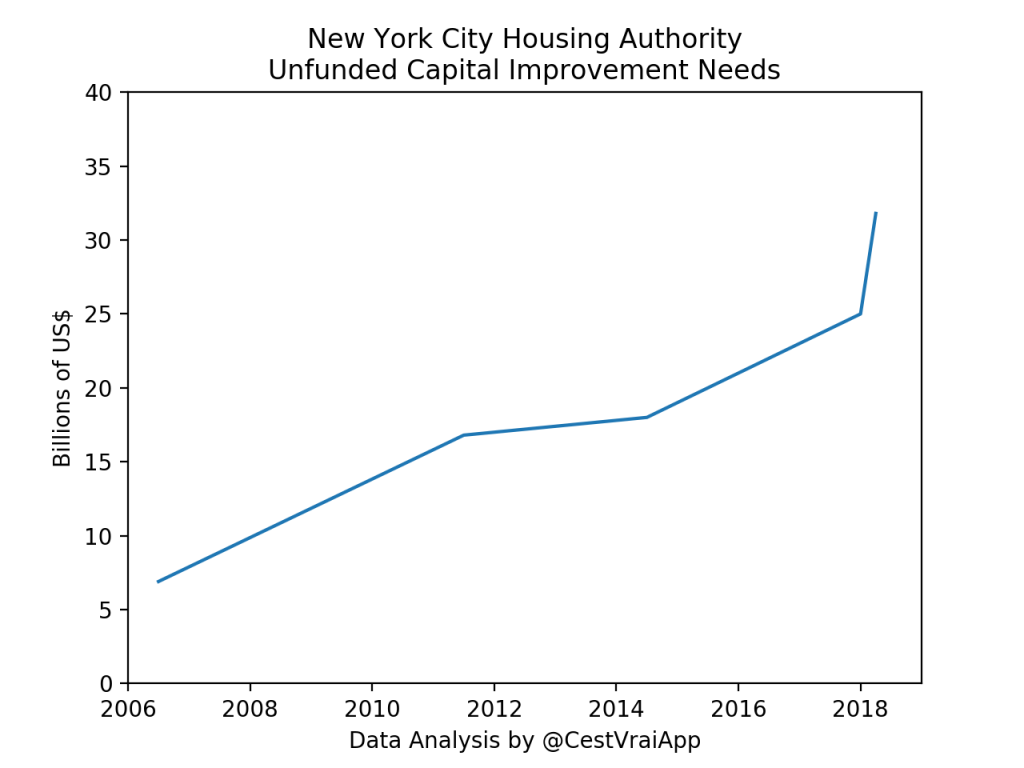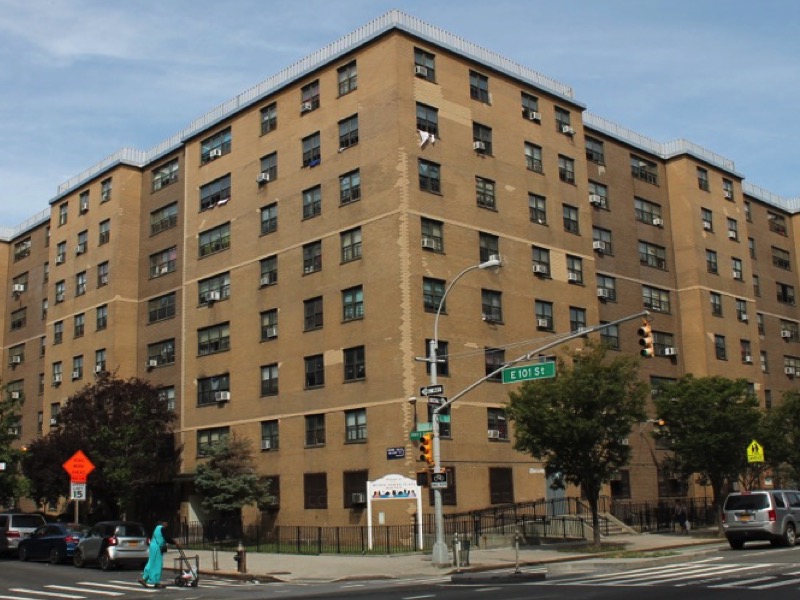Unmet capital improvement budget shortfall makes dramatic rise in wake of Federal investigation into lead poisoning
By Progress New York Staff
When the U.S. Attorney’s Office announced a settlement of its physical conditions standards investigation into the New York City Housing Authority, the announcement boasted a potential repair fund of $4 billion over five years to help the public housing authority with its backlog of repairs. Federal prosecutors demanded that the City of New York set aside $1,2 billion to help establish the repair fund. That set-aside could include an additional $1 billion in the following five years. When the settlement announcement was made, on 11 June 2018, some advocates for saving and expanding public housing began to believe that the City’s public housing agency was going to turn a corner. For decades, public housing has been being defunded by Washington in order to support the privatisation of public housing under a neoliberal program with the Orwellian name, Rental Assistance Demonstration, or RAD.
The investigation’s findings included that NYCHA was repeatedly making false statements to the public about its compliance with Federal lead paint regulations. Nevertheless, about three weeks after the settlement was announced, POLITICO New York published a report, revealing that NYCHA’s true, five-year capital improvement budget need was estimated at $31,8 billion, raising the spectre that the size of the repair fund announced by Federal prosecutors turned out to be woefully inadequate. For this report, the press office supporting the Federal prosecutors’ office in Manhattan did not answer press inquiries about the sufficiency of the repair fund size.
A quintupling of NYCHA’s unfunded capital improvement budget over 12 years, as public housing-private housing issue goes unexamined

The sources documenting the dramatic rise in NYCHA’s unfunded capital needs have been reports published by NYCHA, the New York Times, and the Gotham Gazette.
Whereas much focus has been placed on the size of NYCHA’s capital improvement fund deficit, what is going overlooked for some is the fact that as many as 820 children have been diagnosed with lead blood poisoning in New York City in the last few years, but de Blasio administration officials have at times clung to the assertion that only 19 children living in public housing were diagnosed with lead blood poisoning, leaving unexamined the possibility that private sector landlords may be the source of an unknown number of lead blood poisoning amongst children. For this report, the press office supporting the U.S. Attorney’s Office would also not say whether it was possible that private sector landlords could be at least partly responsible for the spike in lead blood poisoning amongst New York City children. Published reports have also raised the possibility that lead levels in New York City’s drinking water may be rising.
When NYCHA was founded, popular sentiment regarded housing as a public good.
In 1934, the year in which NYCHA was founded, a meeting of 800 delegates, who represented 750,000 workers, approved a resolution “to recognize housing construction and maintenance as a ‘public enterprise’,” according to a report published at that time then by the New York Times. Over time, NYCHA grew to become the largest public housing authority in the nation and the largest residential landlord in New York City. But because of the relentless budget cuts to social and economic programs by Washington and the spread of neoliberalism in New York politics, NYCHA has been neglected, some say with a deliberate intention to facilitate its privatisation.
In response to the growing financial and physical conditions standards crises at NYCHA, Councilmember Ritchie Torres (D-Fordham), the former chair of the municipal legislature’s public housing committee, was quoted in the POLITICO New York report as advocating support for the RAD program and for a controversial Bloomberg-era scheme know as the “infill plan,” which would involve selling or leasing the gardens and playgrounds in public housing developments to real estate developers for market-rate housing construction. Neoliberal schemes, such as these, would violate the public pact created in the New Deal era when NYCHA was founded that called for housing to be treated as a “public enterprise.”
Recommended Reading
- NYCHA FOIL response identifies developments that tested positive for lead in water [Progress Queens]
- Despite tests showing elevated lead levels at NYCHA, City Council hearing concludes lead not a widespread problem [Progress Queens]
- Torres, Council chair on public housing, mum on Olatoye’s future in wake of lead poisoning crisis at NYCHA [Progress Queens]
- NYC water tests from the last four years show increased levels of lead that exceed 15 ppb [Progress Queens]
- Department of Environmental Protection closes FOIL Request with partial response about Lead and Copper Rule tests [Progress Queens]

